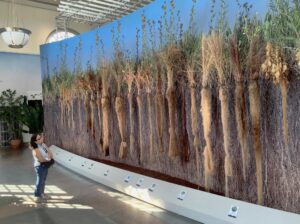 Greenpeace Day has observed annually on September 15th to mark the founding anniversary of the famous international NGO. Greenpeace has evolved from a single organization to a network of organizations that crosses more than 55 countries on all inhabited continents. It is the world’s largest environmental organization starting with Greenpeace International and 26 largely autonomous regional offices. The day is also considered a celebration of environmental activism in general and is dedicated to bringing about a change in how humanity treats the environment. Celebrate this day by participating in peaceful protests to improve air quality, reduce dependency on fossil fuels, avoid excessive and unnecessary plastic usage, improve water quality, and more.
Greenpeace Day has observed annually on September 15th to mark the founding anniversary of the famous international NGO. Greenpeace has evolved from a single organization to a network of organizations that crosses more than 55 countries on all inhabited continents. It is the world’s largest environmental organization starting with Greenpeace International and 26 largely autonomous regional offices. The day is also considered a celebration of environmental activism in general and is dedicated to bringing about a change in how humanity treats the environment. Celebrate this day by participating in peaceful protests to improve air quality, reduce dependency on fossil fuels, avoid excessive and unnecessary plastic usage, improve water quality, and more.
Category: Environment
Jackson County Gardening Assistance
There is going to be a series of talks held at the Jackson County Agriculture Center in Mariana (2741 Penn Avenue). This will be a huge benefit to gardeners in Jackson County who wish to grow their own food. The first focuses on Companion Planting and will be held Wednesday, September 14th from 10-11:30am. It will cost $5 per person. There is no pre-registration required. However, you can call to reserve a spot to guarantee your spot; call 850-482-9620 to get your name on the list.
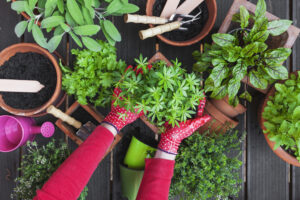
The second class focuses on Fall Gardening. It will be held on Saturday, September 17th from 9am – noon. Participants will get to take home a variety of seeds. This class will cost $15 per person.
The third class focuses on Garden to Table: Herbs. It will be held Tuesday, September 27th from 6-8pm. This event costs $15 per person. Participants will receive a small planter of herbs and a sample jar of dried herbs to take home. Additionally, they will have the change to taste several ways to use herbs in cooking during the class.
Benefits of Backyard Bats
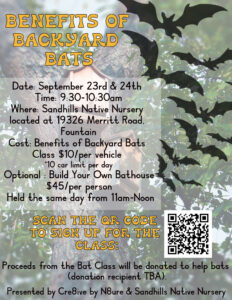 Sandhills Native Nursery is opening for Fall hours on September 22nd. To celebrate, they are hosting a Benefits of Backyard Bats class with Cre8ive by N8ure. The class will run from 9:30am – 10:30am on September 23rd and 24th. Led by Nate, creator of Cre8ive by N8ure and bat educator, the class will focus on how the bats provide insect management, their reproductive cycle, their habitat and diet, and flora and fauna that is beneficial for bats. Due to parking limitations, the class has only 10 spots and you must register to secure your parking spot; the cost is $10 per car. However, these spots are counted by the vehicle not individual, so the nursery encourages carpooling with friends or family.
Sandhills Native Nursery is opening for Fall hours on September 22nd. To celebrate, they are hosting a Benefits of Backyard Bats class with Cre8ive by N8ure. The class will run from 9:30am – 10:30am on September 23rd and 24th. Led by Nate, creator of Cre8ive by N8ure and bat educator, the class will focus on how the bats provide insect management, their reproductive cycle, their habitat and diet, and flora and fauna that is beneficial for bats. Due to parking limitations, the class has only 10 spots and you must register to secure your parking spot; the cost is $10 per car. However, these spots are counted by the vehicle not individual, so the nursery encourages carpooling with friends or family.
Additionally, there will be a second class opportunity on both days. If you are interested in building your own bat house to take home, hang out at the nursery for roughly 30 minutes after the Benefits of Backyard Bats. The delay is designed to give participants time to grab a drink, walk around the nursery, or have a quick lunch. Please note that the Build Your Own Bathouse class costs $45 per person. All required materials and instruction from bat house building expert Nate will be included in the cost.
Proceeds from both classes will be donated to a local organization that assists bats (organization TBA). Visit SNN’s event website HERE to sign up for the class and/or Bat House creation event.
Monarch Butterflies Now Endangered
 On Thursday, the International Union for the Conservation of Nature added the migratory monarch butterfly to the “red list” of threatened species.(1) One of the most recognizable butterflies in the world, the monarch butterfly (Danaus plexippus) is famous for its seasonal migration. Millions of monarchs migrate south from the United States and Canada to California and Mexico for the winter.(2)
On Thursday, the International Union for the Conservation of Nature added the migratory monarch butterfly to the “red list” of threatened species.(1) One of the most recognizable butterflies in the world, the monarch butterfly (Danaus plexippus) is famous for its seasonal migration. Millions of monarchs migrate south from the United States and Canada to California and Mexico for the winter.(2)
It has distinctive orange wings with black lines and white dots. Monarchs live an average of 6-8 months, weigh under 0.001 ounces, and have a medium wingspan of 3.9 inches. Their move to the endangered list means they are just two distinctions from extinction. The primary causes of their move to the red list are loss of habitat and climate change. Want to help the monarch population during this critical time?
The number one thing you can do is plant native milkweed and supplementary plants. There is a number of native milkweeds to choose from – visit UF|IFAS’s Milkweed Species Native to Florida for the complete list. However, there are milkweeds that are essential for monarch butterflies to be able to complete their life cycle within your garden. Female monarchs prefer to lay on swamp milkweed (Asclepias incarnata) and common milkweed (A. syriaca).(3)
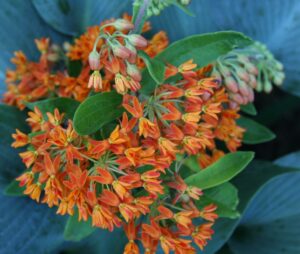
Milkweed is crucial to the diet of monarchs; their distinctive coloring is not an invitation to be eaten but a warning to predators that they are poisonous. They have evolved to not only tolerate but use the toxicity naturally occurring in milkweed to protect themselves by storing it in the veins. Monarchs will feast on all milkweed varieties however, butterfly weed (A. tuberosa) is native to Florida, widely available, and has beautiful flowers.
Supplementary plants are plants of other species that should be planted around milkweed to assist in a healthy ecosystem. These are plants that should be chosen based on each individual location’s soil, sun, and water retention rates as well as hardiness zone. Please remember to always choose native plants to increase the health of your soil and the natural benefits of your garden.
Make Your Yard Florida Friendly
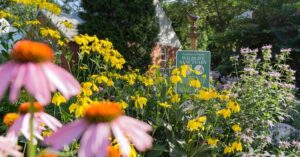 Next Saturday, July 30th, Native Nursery of Tallahassee is hosting a Florida-Friendly Landscaping class. From 10-11 am, learn how to help protect Florida’s environment and make your yard a wildlife habitat. Rachel Mathes will teach the class how to use the Nine Principles of Florida-Friendly Landscaping, her goals for the program, and then guide the class through the steps to creating a more sustainable yard.
Next Saturday, July 30th, Native Nursery of Tallahassee is hosting a Florida-Friendly Landscaping class. From 10-11 am, learn how to help protect Florida’s environment and make your yard a wildlife habitat. Rachel Mathes will teach the class how to use the Nine Principles of Florida-Friendly Landscaping, her goals for the program, and then guide the class through the steps to creating a more sustainable yard.
Please note that registration is required via phone order. The fee is $5 and holds your spot in the class as it is limited to 15 participants. Please call (850) 386-8882 to pre-register. PARKING: Please use driveway next door to the nursery with ‘Workshop Parking’ sign seen from Centerville Road.
First Woman to Hike All 11 National Scenic Trails
Arlette Lann has become the first woman to hike all 11 National Scenic Trails on July 11th! Lann moved from Holland to Massachusetts, and has hiked around 19,000 miles to complete all the National Trails. She finished her record-setting hike at the Ice Age trail in Potawatomi State Park in Wisconsin. The other 10 Scenic Trails are as follows:
-
- Appalachian Trail: a 2,180-plus mile-long public footpath in the Appalachian Mountains.
- Arizona Trail: stretches more than 800 miles across the entire length of the state, from the U.S.-Mexico border to Utah.
- Continental Divide: stretches across the United States approximately 3,100 miles between the borders of Mexico and Canada.
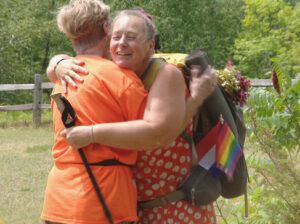
- Florida: a federally-designated recreation trail of about approximately 1,500 miles.
- Natchez Trace: five sections of hiking trail that runs roughly parallel to the 444-mile long Natchez Trace Parkway scenic motor road in Alabama, Mississippi, and Tennessee.
- New England: covers 215 miles from Long Island Sound, across long ridges, to scenic mountain summits in Connecticut and Massachusetts.
- North Country Pacific Crest: spans eight states, including Michigan, Minnesota, North Dakota, New York, Ohio, Pennsylvania, Vermont, and Wyoming.
- Pacific Crest: covers a distance of 2,650 miles through California, Oregon, and Washington, all the way to the Canadian border.
- Pacific Northwest: travels more than 1,200 miles through Montana, Idaho, and Washington, before reaching the Pacific Ocean near Cape Alava.
- Potomac Heritage: travels through D.C., Maryland, Pennsylvania, and Virginia.
Navarre Beach Sea Turtle Conservation Center
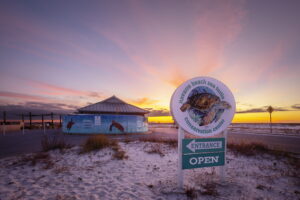 The Navarre Beach Sea Turtle Conservation Center (NBSTCC) is “Giving sea turtles more tomorrows through conservation, education, and research.” A nonprofit organization founded in 2013, the NBSTCC is a working conservation and education center. They currently welcome walk-in guests at a reduced capacity Tuesday through Saturday, 10 am – 4 pm. Please note that, due to the reduced capacity, there may be a waitlist; check their Facebook page here for current information.
The Navarre Beach Sea Turtle Conservation Center (NBSTCC) is “Giving sea turtles more tomorrows through conservation, education, and research.” A nonprofit organization founded in 2013, the NBSTCC is a working conservation and education center. They currently welcome walk-in guests at a reduced capacity Tuesday through Saturday, 10 am – 4 pm. Please note that, due to the reduced capacity, there may be a waitlist; check their Facebook page here for current information.
NBSTCC is a predominately volunteer-run organization that operates in a 2,010-square-foot conservation and education center. Learn more about volunteering with the organization HERE. Alongside walk-in visits and scheduled private tours, NBSTCC also offers paid experiences: Painting Tortoise Tracks, Honorary Animal Care Team Member, Shark School, and Shark Tooth Treasure Hunt. Visit the NBSTCC website here for more information on experiences, the organization, and turtle conservation.
Wetlands Nature Hike in Jacksonville
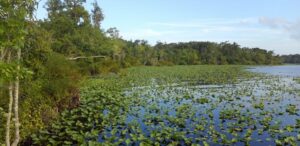 Clay County Parks and Recreation is hosting a wetland tour Saturday, July 16th. The tour will be guided by one of the Camp Chowenwaw Park naturalists. They will give information on Clay County’s wetlands ecosystem. The wetland tour will take place at Camp Chowenwaw Park at 1517 Ball Road, Green Cove Springs. Everyone will meet at 9:30 am by the picnic area to the left of Big Cabin. Bug spray, water, and closed-toe shoes are highly recommended. Registration is REQUIRED and free! Space is limited to 20 people. Click here to register.
Clay County Parks and Recreation is hosting a wetland tour Saturday, July 16th. The tour will be guided by one of the Camp Chowenwaw Park naturalists. They will give information on Clay County’s wetlands ecosystem. The wetland tour will take place at Camp Chowenwaw Park at 1517 Ball Road, Green Cove Springs. Everyone will meet at 9:30 am by the picnic area to the left of Big Cabin. Bug spray, water, and closed-toe shoes are highly recommended. Registration is REQUIRED and free! Space is limited to 20 people. Click here to register.
Native Grasses
Native grasses are an essential topic that many don’t consider. Many of the green pasture grasses you see today are actually from other countries and contain 10x the amount of chemicals as farmland.(1)
Native grasses are more cost-efficient as they require far less maintenance and promote beneficial wildlife. Natives have existed in the ecological landscape for so long that they have adapted to the soil, terrain, sunlight, and moisture conditions. This means homeowners won’t waste as much time and money watering, cutting, or reseeding. Reseeding is a natural aspect of native grasses because they are perennial which means they self-seed each year. They are more prepared to deal with natural droughts because their roots reach far, far down into the ground (see photo). This also means native grasses are beneficial for soil erosion; plant native grasses near pond edges and more. Their far-reaching roots also assist in maintaining healthy soil. Furthermore, native grasses are naturally resistant to many of the local pests and diseases that many homeowners would usually treat with pesticides. Not only does using fewer pesticides save you money but it also means a healthier ecosystem – less poison means more pollinators, healthier soil, and less chemical runoff that can affect human and animal lives.
Learn more about native grasses, groundcover, and lawngrasses HERE at the UF|IFAS extension website.
Real Florida Reader
 Florida State Parks is partnering with the Florida Department of State, Florida’s Bureau of Library Development, and local libraries throughout the state to offer Real Florida Reader day passes so families and individuals can continue their learning adventure while exploring new places. Head to your nearest public library and check out a book to get started on your #RealFloridaReader day pass. Both the library card and day pass are free! Each pass covers one vehicle entrance fee (with up to eight people inside).
Florida State Parks is partnering with the Florida Department of State, Florida’s Bureau of Library Development, and local libraries throughout the state to offer Real Florida Reader day passes so families and individuals can continue their learning adventure while exploring new places. Head to your nearest public library and check out a book to get started on your #RealFloridaReader day pass. Both the library card and day pass are free! Each pass covers one vehicle entrance fee (with up to eight people inside).
